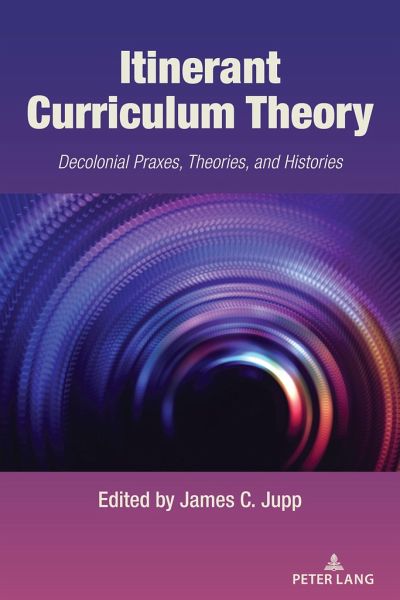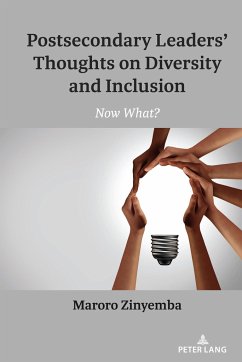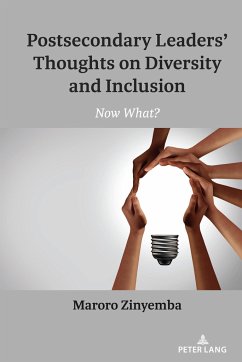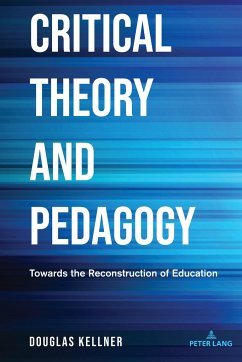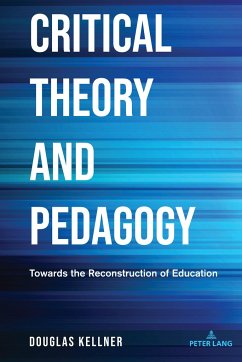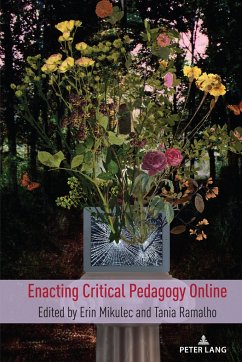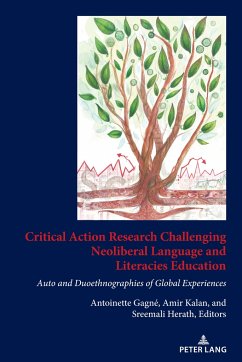Broschiertes Buch
Itinerant Curriculum Theory
Decolonial Praxes, Theories, and Histories
Herausgegeben: Jupp, James C.
Versandkostenfrei!
Versandfertig in 6-10 Tagen
Weitere Ausgaben:

PAYBACK Punkte
0 °P sammeln!





This edited volume provides a compendium of recent work on critical curricularpedagogical praxes via itinerant curriculum theory (ICT). Overall, this volume advances ICT as a transnational-local way of doing critical curricular-pedagogical praxes, up-from-below, within bioregions. For those interested in doing critical pedagogy from an historicized, transnational, yet local perspective, this book is indispensable.
James C. Jupp is Professor and Chair of the Department of Teaching and Learning at the University of Texas Rio Grande Valley. His decolonial work on ICT is deeply indebted to the people and bioregion of the Rio Grande Valley along with his colleagues over the years. Itinerant curriculum theory (ICT) attempts to create an itinerant path to address the problem of coloniality-globalization. ...This is crucial because it allows one to critique the complex processes of axiomatization of specific codes within the capitalist society from slavery in the 1400s to the current slavery constructions as de-/re-/coded flows of an economy and culture pumped by an epidemic of overproduction within the colonial matrix of power. Excerpt from chapter 10 by João M. Paraskeva, author of Conflicts in Curriculum Theory, Curriculum Epistemicide: Towards an Itinerant Curriculum, and Curriculum and the Generation of Utopia. I find it illuminating to consider itinerant curriculum theory (ICT) as advanced in this new volume... I see this as an embodied theory that we need to imagine, pursue, and live-continuously evolving, never ending curricula which we should all seek to be and share. I see it as a shape-shifting theory that lives within us and is recreated in each situation encountered, striving to do and be what is worthwhile and just. Excerpt from afterward by William H. Schubert, Professor Emeritus of Curriculum Studies, University of Illinois at Chicago and co-editor with Ming Fang He of the Oxford Encyclopedia of Curriculum Studies and author of Love, Justice, and Education: John Dewey and the Utopians.
Produktdetails
- Verlag: Peter Lang
- Artikelnr. des Verlages: X67353
- 1. Auflage
- Seitenzahl: 386
- Erscheinungstermin: 26. September 2023
- Englisch
- Abmessung: 225mm x 150mm x 21mm
- Gewicht: 541g
- ISBN-13: 9781636673530
- ISBN-10: 1636673538
- Artikelnr.: 67831911
Herstellerkennzeichnung
Lang, Peter GmbH
Gontardstraße 11
10178 Berlin
r.boehm-korff@peterlang.com
"Itinerant curriculum theory (ICT) attempts to create an itinerant path to address the problem of coloniality-globalization. In so doing, it faces undesirable yet unavoidable and needed, black holes. ICT sees the confrontation with such holes as a reassembled set of processes towards a creative and desirable plan of (in)consistency only possible by respecting a perpetual itinerancy. Such a theory(ist) understands the structure and flows of a given social formation. Its itinerancy allows the theory(ist) to grasp why the imposition, certification, and legitimization of particular un/re/coding metamorphoses, as well as the eclipse of so many others. That is, ICT reads and challenges such codes that frame each social formation and fuel the
Mehr anzeigen
wrangle of oppressor-oppressed. This is crucial because it allows one to master the complex processes of axiomatization of specific codes within the capitalist society from slavery in the 1400s to the current slavery constructions as de-/re-/coded flows of an economy and culture pumped by an epidemic of overproduction within the colonial matrix of power... ICT is sentient that the 'politics of cultural diversity and mutual intelligibility calls for a complex procedure of reciprocal and horizontal translation rather than a general theory' (Santos, 2007, p. xxvi). ICT, as Paraskeva argues, is people's theory." Excerpt from chapter 10 by João M. Paraskeva, author of Conflicts in Curriculum Theory, Curriculum Epistemicide: Towards an Itinerant Curriculum, Towards a Just Curriculum: The Epistemicide, and Curriculum and the Generation of Utopia. The critique defines Dr. Paraskeva as one of the most acclaimed curriculum theorists. He is Professor of Education at the University of Strathclyde, Glasgow. Curriculum Epistemicides was awarded the American Educational Research Associations Division B book award in 2016.
Schließen
Für dieses Produkt wurde noch keine Bewertung abgegeben. Wir würden uns sehr freuen, wenn du die erste Bewertung schreibst!
Eine Bewertung schreiben
Eine Bewertung schreiben
Andere Kunden interessierten sich für



